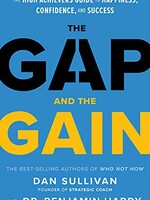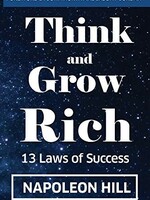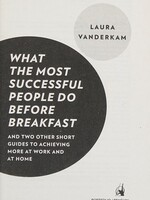
Procrastinate on Purpose - Book Summary
5 Permissions to Multiply Your Time
In this episode of 20 Minute Books, we delve into "Procrastinate on Purpose", a transformative guide by Rory Vaden that empowers you to reclaim your time and enhance productivity. Published in 2019, this book unveils straightforward techniques to not only manage your time more efficiently but also to live a life less burdened by the shackles of constant busyness. Vaden, armed with an MBA, is not just an author but a co-founder of Southwestern Consulting, a mentor, and a motivational speaker whose expertise in business development and customer experience shines through his work. Having already achieved bestseller status with his first book, "Take the Stairs", Vaden's insights on productivity have garnered attention from major platforms including CNN and Oprah Radio.
"Procrastinate on Purpose" is for the overworked soul seeking solace in time management tips that promise not just productivity, but also a prioritized, purposeful life. Whether you're a workaholic struggling to find a moment's peace, or a manager on a quest to enhance team productivity, this book holds the key to unlocking a lighter schedule and a focus that’s strictly on your priorities. Join us as we explore how to purposefully procrastinate, transforming what is often considered a vice into a virtue that can lead to success and satisfaction.
Redefining productivity: Making time instead of finding it
In the whirlwind of our modern lives, we wear our busyness like a medal of honor. Racing from one commitment to the next, we believe that this non-stop activity signals to the world our unmatched productivity. However, this frenzied pace often leaves us feeling swamped, disheveled, and perpetually catching up. So, where does the solution lie?
Prepare to have your previous notions of time management and productivity flipped upside down. We're venturing into uncharted territory, guided by the expertise of Rory Vaden, a celebrated management consultant. He challenges conventional wisdom, revealing that the secret to accomplishing more is, paradoxically, doing less. This journey will unravel methods not just to extend your hours, but to enhance your financial savvy and overall efficacy.
Through this exploration, we will uncover:
- The strategies employed by high achievers to sidestep the hustle and bustle;
- The invaluable lesson in focus we can learn from those who till the land;
- And the hidden cost of your routine $5 coffee — a startling $35, by a different calculation.
Embrace this fresh perspective and discover how to truly make time, rather than scrape by in a futile attempt to find it.
Unlock the secret to boundless productivity: Stop bemoaning your busyness
Feeling swamped by the endless tasks that demand your attention? You're in good company, as countless individuals grapple with the challenge of squeezing a day's worth of activities into seemingly insufficient hours. Whether it's routine chores, the daily job, or the eternal quest for misplaced items — which astonishingly consumes an hour each day — the wonder isn't that we struggle, but that we manage to fulfill these responsibilities at all. So, the pressing question emerges: How can we master our time more effectively?
The counterintuitive first step? Cease lamenting over your packed schedule.
This adjustment might seem daunting. Take Rory Vaden, who initially thrived on conveying his busyness. When inquired about his day, he'd dramatically recount his endless to-do list. Amidst a world where the average executive deals with 116 emails daily, Vaden — as a cofounder of a global consulting firm — was no stranger to an overflowing inbox. However, upon reflection, he recognized his complaints of busyness as a badge of self-importance.
His perspective shifted remarkably after interacting with what he labels as 'multipliers' — individuals who magnify their productive hours without succumbing to the stress of busyness. These exemplary figures seldom, if ever, voice complaints about their crammed schedules.
Intrigued, Vaden inquired a multiplier about her seemingly lighter workload, only to discover that her secret was not in having less to do, but in refusing to waste energy lamenting over her tasks. Rather than fretting, she concentrates on the work at hand.
Observing these multipliers closely revealed an invaluable lesson: accepting rather than resisting the reality of a busy schedule fosters a serene mindset. These individuals might have packed days, but stress doesn't gain a foothold. They adopt an empowered stance — taking full responsibility for their commitments and sidestepping the victim mentality.
Emulating these multipliers means recognizing that our commitments are ours — chosen by us. By owning these choices, we unlock the strength to navigate our schedules effectively, shedding the cloak of victimhood and embracing a path of proactive solution-finding. Remember, you're not merely a bystander in your life — you're the architect, capable of meeting your obligations head-on.
The art of subtraction: How less can be your path to more
In a world that constantly chants the mantra of addition for success, we find ourselves continuously seeking what more we can do, learn, or add to our routines to achieve greatness. Whether it's embracing a new productivity hack or adding another task to our morning rituals, the instinct to pile on more in the quest for success seems almost hardwired. But here lies the paradox — the true secret to amplifying your achievements and productivity doesn't reside in the realm of addition but in the art of subtraction.
The notion of trimming activities rather than accumulating them may appear challenging at first. Why? Because our inner achievers delight in the feeling of accomplishment, leading us to fill our days with tasks — even insignificant ones — just for the temporary thrill of checking them off. Who hasn't experienced the odd satisfaction of adding a completed task to a to-do list, solely for the pleasure of crossing it out?
Yet, those who truly excel — the multipliers — approach their days with a critical eye, constantly scrutinizing their schedules for tasks that can be eliminated. Their focus is sharpened on outcomes rather than activities, understanding that success is measured not by the volume of tasks completed but by their significance.
To embark on the journey of becoming a multiplier yourself, adopt the lens of elimination. Scrutinize your daily activities, identifying which can be cut to free up time for what truly matters. And if you're seeking a starting point, consider these notorious time-drainers begging for elimination.
First up, television. It's staggering to realize that the average American dedicates over 34 hours a week to TV watching — practically mirroring a full-time job's hours. When tallied up, this equates to roughly nine years of life spent in the thrall of the screen. Should TV remain unchecked on your list, it's time to reconsider before claiming a packed schedule.
Second, take a critical look at meetings within your workday. Revealed as the prime time-waster by 47 percent of professionals in a survey, meetings often devour more productivity than they generate. Before automatically accepting your next meeting invitation, pause to consider its necessity to your knowledge and decision-making responsibilities. If it fails to meet these criteria, you've identified another candidate ripe for elimination.
By embracing the counterintuitive approach of doing less, you pave the way towards genuine productivity and success, proving once and for all that in the pursuit of greatness, sometimes less indeed is more.
Investing in today for a richer tomorrow: Time and money wisdom from multipliers
Ever pondered whether your mindset aligns more with that of the affluent or the masses? To uncover the truth, consider this straightforward gedankenexperiment focused on a mundane decision — purchasing a $5 coffee. Where most might merely question if their wallet permits this small luxury, those with a wealth-conscious perspective delve deeper. They recognize that every expenditure foregoes potential future gains, embodying an investment mindset, which prioritizes the future value over immediate gratification.
This philosophy extends beyond mere financial acumen, serving as a cornerstone for 'multipliers' who excel not just in accumulating wealth, but in creating time itself. The approach is straightforward yet profound: view time as a resource that, like money, can be wisely invested to yield more of it.
Consider the scenario where you resist the temptation of today's coffee, opting instead to invest that $5. At a modest annual interest rate of 8 percent, thanks to compound interest, that seemingly trivial amount blossoms into $30 over three decades. Herein lies a revelation — the true cost of indulging in the coffee today isn't just $5, but $35, accounting for the foregone future enrichment. The question then becomes, is the fleeting pleasure worth the long-term sacrifice?
Multipliers adopt this forward-thinking approach not just with finances but in how they manage their time. They scrutinize tasks, especially repetitive ones, through a lens of potential automation. By automating routine duties, they liberate countless hours, transforming what was once time spent into time saved.
Yet, many organizations remain hesitant to embrace such an investment mindset, particularly concerning automation. The irony is stark — while companies perceive automation as a cost, not investing in it ultimately proves far costlier in squandered time and lost opportunities.
So, if you find yourself stuck in a cycle of manual repetition, whether in personal tasks or within a business context, consider the wisdom of multipliers. By granting yourself the permission to automate today, you're not just saving time — you're crafting a future rich in both time and potential financial prosperity. Embrace the investment mindset and watch as both your time and money grow, proving that investing wisely today paves the way for a bountiful tomorrow.
Mastering the art of delegation: A catalyst for efficiency
In the relentless quest to manage our ever-growing list of tasks, one pivotal strategy often gets overlooked — delegation. From daily chores to professional projects, imagine the myriad of tasks that crowd your agenda. Now, envisage the possibility: could these tasks find a better fit with someone else, thereby liberating your precious time?
The notion raises a natural question: if delegation holds such promise for efficiency, why isn't it more universally practiced?
The answer lies in our apprehensions. The concern that a task won't be executed to our stringent standards, or anxiety over punctuality, often handcuffs us to the notion that personally undertaking the task is the faster route. However, this assumption more commonly than not, proves to be a fallacy.
Consider, for a moment, a task that consumes five minutes of your day. Opting to delegate it, you commit to an upfront investment of 150 minutes instructing someone else. This figure stems from the 30x rule suggested by business school wisdom: for every minute of task execution, thirty minutes should be allocated to training a delegate.
The initial reaction might be skepticism — wouldn't it simply be more efficient to handle it yourself? Yet, when you project this over a year, the accounting shifts dramatically. That daily five-minute task cumulatively consumes 1,250 minutes across a 250-day working year. The initial 150-minute investment in delegating, in contrast, leaves you with a net saving of 1,100 minutes annually.
Many balk at the prospect of delegation, tethered to the belief that the cost of hiring assistance overshadows the benefits. However, a deeper dive into the economics of time versus money dispels this myth. If your earnings equate to $40 an hour, delegating 1,100 minutes — when the delegate’s hourly rate is lower than your own — not only enhances your efficiency but also proves to be financially astute.
The key takeaway? Embark on the journey of delegation. It's not just about offloading tasks; it's about intelligently reallocating your resources to optimize your productivity and earnings. By embracing another’s assistance, you don’t just delegate tasks — you multiply your own capacity to achieve more.
The strategic pause: When procrastination becomes a virtue
As the day wanes into evening at a tranquil lakeside, a fisherman's success becomes apparent through his bounty of fish. Yet, hours earlier, his persistence by the water would yield nothing. The explanation is as simple as it is profound: fish predominantly feed at dawn and dusk, not under the high noon sun. This natural rhythm underlines a broader life lesson — triumph isn't solely a product of action or the duration spent on endeavors; timing plays a pivotal role.
This introduces an unconventional proposition: the deliberate decision to procrastinate.
Before visions of neglected gym routines or binge-watching sessions cloud your judgment, let's refine our understanding. The procrastination in question isn't about deferring tasks out of reluctance but embracing the wisdom of acting at the most opportune moment. This discerning approach to delay is a hallmark of the enlightened 'multiplier,' for whom patience isn't just a virtue but a strategic asset.
Consider a business owner renowned for her efficiency, who prides herself on swiftly ticking off items on her monthly agenda. Faced with an order that's not due for two weeks, her instinct propels her to prepare it immediately post-conversation with the client. However, should the client return with amendments or cancel the order, her preemptive action morphs into wasted effort, necessitating additional work. Conversely, had she exercised patience, allowing for potential last-minute adjustments, she could conserve both time and resources.
This scenario underscores the inherent value of patience, serving as a buffer against life's inevitable uncertainties — be it meteorological shifts, market fluctuations, or evolving customer preferences. In an era where change is the only constant, the ability to strategically procrastinate — to wait and see — emerges not as a fault but as a foresight.
Thus, let's not hastily dismiss procrastination. Instead, view it as a calculated pause, a moment of patience that can, paradoxically, propel us forward by ensuring we act not just promptly but appropriately.
Harvesting focus: The multiplier's guide to prioritizing effectively
Picture the diligence of a farmer during harvest season, laboring through 18-hour days without room for error, illness, or pause. Her success hinges on an unwavering focus on a singular goal — to gather the crops that will sustain her for the upcoming year. This lesson in concentrated effort isn't just for those tilling the fields but is a universal principle that can transform how we approach our most pressing tasks.
We have explored ways to magnify our time through various strategies — elimination, automation, delegation, and the judicious application of procrastination. Yet, when none of these avenues are viable, the task at hand demands our undivided attention, stepping into the spotlight as our clear priority.
Achieving unbroken focus in today's distraction-filled environment is no small feat. However, elite multipliers deploy specific strategies to harness their attention fully.
A revealing insight from the author's research within his consulting firm shows a striking dichotomy: While a scant 10 percent of the general populace employs a comprehensive written plan for their weekly time allocation, an overwhelming majority of 85 percent of multipliers do. This discrepancy underscores a critical realization — multipliers are acutely aware of the detrimental impact distractions can have on fulfilling their priorities and meticulously structure their time to mitigate such disturbances.
Yet, the creation of a schedule alone does not guarantee success. When it's time to engage with a priority, your presence, both mentally and physically, is imperative. The common pitfall of allowing the mind to wander dilutes the intensity of our focus. Immersing oneself entirely in the task at hand ensures that it isn't merely another item on your to-do list but a genuine priority.
An essential clarification warrants attention here: the concept of 'priority' inherently suggests singularity. Despite the multitude of commitments vying for our attention, true prioritization demands that we afford complete focus to one task at a time. This means setting aside thoughts of other significant areas of our lives, such as family concerns, when we're entrenched in solving a business challenge. The conflation of multiple 'priorities' is an oxymoron; true priority requires exclusive attention.
In embodying these principles, we can cultivate a 'harvesting focus' akin to that of the farmer, channeling our energies diligently towards achieving what truly matters, one priority at a time.
Time Management: A Corporate Strategy, Not Just a Personal Goal
Imagine the enormity of time squandered within the confines of your office. A staggering revelation from a survey involving 10,000 participants by a renowned consultancy illuminates the gravity of the situation — the average individual fritters away 2.09 hours daily on non-essential activities. This revelation underscores that the advocacy for time management transcends personal ambition; it's a critical business necessity.
To put this into perspective, let's gauge the financial toll of this inefficiency on American enterprises. With the average national salary pegged at $39,795, translating to roughly $19 per hour, the wasted 2.09 hours represent an annual loss of $10,396 per employee. The cumulative cost for organizations is, undeniably, colossal.
Despite this, the predilection among businesses skews toward financial economization, often at the expense of time efficiency.
A peculiar discrepancy is observable in organizational operations: while meticulous financial planning and budgeting are de rigueur, a formalized approach toward maximizing time utility remains conspicuously absent. This oversight is pivotal — for while fiscal resources can be replenished, time, once elapsed, is irretrievable.
The remedy lies in cultivating a multiplier mindset, not only at an individual level but as a foundational corporate philosophy. This paradigm shift entails a substantial but worthwhile endeavor, promising a multitude of benefits. Envision an organizational culture where redundancies are systematically excised, tasks are aptly delegated according to competency, and the workforce adeptly navigates between action and strategic pause, with an unwavering focus on the task at hand.
This utopian workplace, defined by peak productivity and profitability, is within reach. The genesis of this transformation begins with individual initiative — embody the principles of purposeful procrastination and exemplify efficiency in your endeavors. Such a proactive approach won't go unnoticed; as your productivity surges, it's likely to inspire emulation among peers.
Thus, the call to action is clear. Champion time management not only as a personal development tool but as an organizational strategy. By fostering a multiplier culture, we pave the way for an enterprise that’s not only financially astute but masterfully efficient with its most precious commodity — time.
Unlocking Time: A Blueprint for Personal and Organizational Efficiency
In an era where time is as valuable as currency, both individuals and organizations stand at a crossroads, hemorrhaging this invaluable resource with little to show for it. This inefficiency is not just a dent in productivity but heralds significant financial repercussions. The solution? A rigorous reassessment of how we allot our time, underscored by a strategic approach to daily tasks.
The essence of this method involves a meticulous audit of daily activities, segregating them into categories for elimination, delegation, and prioritization. This isn't merely about trimming the fat or offloading responsibilities; it's a calculated endeavor to reclaim command over our schedules, thereby optimizing both personal output and organizational performance.
Embrace this framework as your guide to navigating the complexities of time management, ensuring every second is not just spent but invested wisely in pursuit of broader objectives.





